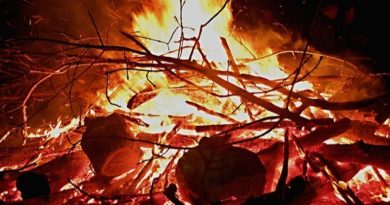Translations
By Amanda Lisle
Hannah, the clouds are turning purple like the earth.
Janey. You were napping.
What are you weaving? Where’s Momma?
She’s at Center Basket with the Olders.
I dreamed the caravan crashed into a mountain. Too high up. People died.
We’re okay, Janey. Go get Momma.
I tightened my grip on the corner rope of the lookout basket, and the bristles hurt my palm. The landscape was far below, mesas with clusters of shattered pale yellow ridges swirling into light and dark purple ravines, not a territory safe for landings. Juno, the tall kid, was looking at me with those eyes of his, blue-black, with long lashes and lids dark around the edges like he painted them, the way girls do for Exchanges. He moved like there was a different kind of energy working through him, not like anyone in my home ‘van. His hair was dark and flame-curly against the sky.
Behind Juno, the clouds swayed. The wind was up; we’d be going faster now, on to nowhere. I could see the jagged black teeth of mountains aways back of him, framed by the ropes. We were gathered in the Lookout, an end basket, floor just wide enough for four to sit cross-legged in a circle, but we were all standing now, me with my back against one side, Juno against the other, and the other two, a girl ― Mina ― and her boy against a third. Those two kissed when adults weren’t looking, though we were all about fifteen and she’d be Exchanged at sixteen whether they liked it or not.
Juno was looking at me with his elbow propped almost the height of his head on the wicker ledge. I was thinking, I lost more that I loved. But I wouldn’t say. Mina had her arm looped around her boy. Her hair was short, and her cheeks splotchy to match her pink nose. She peeked at me from beyond the beak-nosed profile of her boyfriend.
“We think we can trust you,” she said. “You’re tough like us.”
On account of I survived, they thought I was tough. Stay tough, Momma had said on the mountain. All those people pressed around us so close. Snow everywhere and wind that cut. We’d made a tent from the clothes of the dead. And the others clustered against us for body heat, people I’d grown up around but had never touched so much. And still I was shivering, shivering and sweating at once. Momma’s hot breath in my hair, Stay tough. Baby, stay tough.
“Tell,” Juno said.
“Half us died in the crash,” I said, leaning against the wicker ledge and looking off. Far to the left, another caravan was sailing in the sky, black and gray air-balloons lined up in the sky all stuck together, X-marks and L-marks on the balloon faces where repairs had been made. Eighty, maybe eighty-five baskets with bridges between, and lookout baskets like this one T-ed off on either end.
“And the mountain,” Juno said.
“We got blown too high up before we crashed. There weren’t any settlements, no Inghchas, nothing.” I paused. “It was cold.”
“More people died on the mountain,” Mina said.
I sniffed and wiped my nose on the back of my hand. “More, yeah.”
“Any of yours?”
They were all mine.
“We were a hundred twenty-three before. Only thirty-three went back up.” Juno was looking, his look saying Tell. “My sister,” I said. “She was eight.”
“Your mom went over quota,” Mina said. Her voice had finality. Condemning. I cut her a look she’d have to think about a while.
“Lucky we picked you up,” her boy said, his hand grazing her belly. “You’d’ve had to stay with the Inghchas as a slave or something. Or fall. Any survivors fall?”
“Eighteen,” I said.
Juno whistled. “They shoulda waited,” he said. I turned and looked over the edge. We had left the mesas behind, the purple land underneath with its curls of darker purple. People lived down there once.
“Was it a station there, where you were saved, or flat-out Inghcha-ville?” the girl asked.
“Flat-out Inghcha-ville,” I said. My eyes traced the S-curve of a deep purple river below. The fire screamed above us, a three-second blast. We heard the popping of the other fires down the line, and the caravan swung upward with a lazy gesture. I pulled my sweater around me, tying at the belt, and sucked on my lip. The S-curve of the river popped out in starbursts like it had hair that had been electrified. I thought about my little blue sister Janey on the mountain. She had a dream once that our caravan crashed into a mountain and I died in the snow. Close but no cigar, as Daddy said before he fell so long ago. Inside my chest, something hurt but still I didn’t cry for her.
Nola was sitting on the floor of the squatter basket we’d acquired when Juno’s caravan responded to our flares from the Inghcha camp on the death mountain. Nola was native to this ‘van. She hadn’t been chosen to have an Exchange when she was young because of her nose. The rest of her face was pretty, but her nose jutted out at a broken angle, made for a face twice the size of hers, and her pretty eyes tended to look crossways in its wake. She’d been stuck with me and Momma in this squatter because her mother died and a new family took over hers. She was playing with her bird Jerry; all she ever did as far as I could tell.
Nola had the bird perched on her finger, its green body ducking and nodding, blinking its black bead eyes. I was more fascinated with Jerry than I wanted to be; I liked to watch her with it, could lose myself in that for hours. She held it upward now and cooed at it, her thin mouth making a pert O under the surveillance-shadow of that nose. Jerry was an old bird, really old, Nola’s mother’s from Land Days before the war, and that was thirty-two years ago now. I wondered why Jerry didn’t just fly away like all the other birds I’d ever seen. Momma told me his wings were clipped, a thing they used to do in Land Days so they could keep pretty birds in their houses.
“HIM and HER and The GENERAL,” Jerry said in Nola’s mother’s voice. “The GENERAL, Leaders bless them be.”
“He fell, and She fell, and The General flies among us,” Nola said to the bird. She glanced at me. “Say hello to Hannah,” she said to Jerry.
“Hello,” Jerry said. “HE fell, SHE fell.”
I sat down on the wicker floor across from Nola. “Why do we use the same word for falling and leaving?” I asked her. “In every caravan, it’s the same.” She looked at me, the green bird on her finger between us.
“What do you mean?”
“When someone falls from a ‘van, falls into the sky, we say they fell. When someone converts to Inghcha and stays on the ground at the mountain stations, we say they fell.’ Why is it the same?”
“They are sinners,” she said. “They will have death like falling, burning while they fall.”
“That’s the same thing my mother says,” I said. I cross-hatched my fingers and stared into the spaces between. Jerry dropped a fat bird-turd on the woven floor. “We have to live with birdshit carpeting our squatter,” I said, rising. I swung an arc from one of the ropes, letting the bristles scratch my hands. “What if He or She of the legends didn’t really fall, but converted? Or what if one of them jumped? What if our Leaders weren’t so sacred?”
Nola’s mouth got smaller and she lowered Jerry to her white-sweatered breast. “I’m telling your mother you said that,” she said.
“You know why you got a nice squatter? The man there threw his wife and child and then himself over the side. Just snapped and chucked them. No one wanted that squatter,” Mina said. We were back in the Lookout basket, sitting on the floor. Her boyfriend, Owen, sat behind her, chin on her shoulder. Juno was a Lookout at fifteen because the Olders liked him. He stood at the corner, face propped on his hands. Scanning the land.
“He supposed to find our magical uncontaminated island?” I asked, looking up.
“When over the water,” Mina said. “Gotta look. The General says.”
“Thirty-two years,” I said. “More than twice any our lifetime. All these fucking caravans. No island.”
Mina looked at me beneath her brown bangs and then out the wicker gateway. “You aren’t supposed to say that,” she said.
There was a pause.
“Hannah’s right,” Juno said. “There’s no island.”
Mina and Owen craned their necks to look up at him. He’d said it before, I could tell. They looked at him without surprise.
“I have a book,” Juno said, still looking outward.
“We think we can trust you,” Mina said. “You have to be discreet.”
“Discreet,” I said.
“You’ve arrived at the forefront, Hannah,” Juno said, looking down. “You could be part of my trusted few. God is not as we’ve been taught.”
I said nothing. I watched him. In him it seemed like a fire was always going, like his motor was always firing him higher and higher to places we didn’t see.
“He has the sight,” Mina said. “In his dreams they come.”
“Translations,” Owen said. He kissed Mina’s cheek and looked at me half-lidded and intense, a crude Juno imitation. I thought, Juno needs to teach him better.
“It’s the Inghcha Bible,” Juno said. “I’m translating it.”
“Planning to fall?” I asked him.
“No,” he said. “Planning to change. I’m translating it, and they didn’t get it right.”
When I’m older I’m going to have long hair like yours and I’m not going to wear it in a pony all the time. What is a pony?
Keeps my hair out of the way, Dummy.
A real pony, like in legends.
I don’t know, exactly. Animals, I guess, like the Ingchas have in their yards and fields.
If the Inghchas have our fuel, why don’t we like them better?
They have a different God, and we don’t like Him, I guess.
If they give us the cornfuel, what do we give them?
Wool from other Ingchas. Spices. Secrets.
I turned onto my back on my mat and stared at the straw and rope ceiling a foot above my face. It creaked and bulged as above me, Nola shifted in her sleep. I pushed my sister from my mind.
Click below to continuing reading




